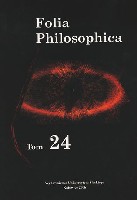Krytyczne stanowisko Jaspersa wobec Heideggerowskiej rozprawy z Nietzschem
Jasper's critical attitude towards Heidegger's battle with Nietzsche
Author(s): Izabela Krupa-MażulisSubject(s): Philosophy
Published by: Wydawnictwo Uniwersytetu Śląskiego
Keywords: The Will to Power; Platonism; metaphysics
Summary/Abstract: The subject of the article constitutes criticism Karl Jaspers included in "Notizen zu Martin Heidegger" – a volume of polemic notes which Jaspers made after he had ended his friendly relations with Heidegger. Jasper's criticism presented in the article focuses on Heidegger's attitute towards Nietzsche's philosophy included in Heidegger's two-volume monograph entitled "Nietzsche". Jaspers, being an astute researcher of Nietzsche's thought, does not agree with Heidegger's interpretation of his thoughts. Jaspers perceives Nietzsche from a historical point of view, presents his thought both in the context of a philosopher and from the angle of his whole artistic work. Being of the opinion that philosophical thoughts should always be understood in connection with the actions of the thinker, Jaspers tried to understand Nietzsche as a whole: his philosophy, personality, the way his thought was shaped and evolved depending on his condition. Such a mode of thinking constituted the basis for criticism presented in this article. Heidegger, on the other hand, focused on The Will to Power, i.e. these elements of Nietzsche's thought which allow for a wider interpretation, and, for example, perceives Nietzsche as a faithful continuator of metaphysical Platonism, while Nietzsche himself perceives himself as the one who turns away Platonism. Jaspers thinks that Heidegger, as a result of his interpretation of Nietzsche's philosophy, narrowed down his way of thinking in a dangerous way, restricting it to those issues which were useful and helpful for him under given circumstances. Simplification Heidegger makes in Jasper's opinion understood not only as oversimplification but, above all, shallowness consisting in narrowing down, deprives Nietzsche's thought of its inventiveness and revolutionary nature.
Journal: Folia Philosophica
- Issue Year: 2006
- Issue No: 24
- Page Range: 282-297
- Page Count: 16
- Language: Polish

